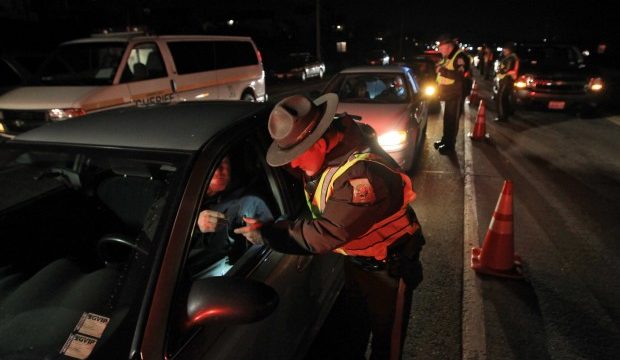Is Your Privacy A Privilege While Driving On Public Roads?

The headline question seems like a no-brainer, right? Of course you don’t lose your privacy rights just because you’re driving on a public road.
Problem is, I don’t think law enforcement and the courts see it that way.
[mks_pullquote align=”right” width=”300″ size=”18″ bg_color=”#000000″ txt_color=”#ffffff”]”Driving on public roads may be a privilege, but is your privacy while traveling on those roads also a privilege? Chillingly, the North Dakota Supreme Court thinks so. As do some law enforcement leaders.”[/mks_pullquote]
Recently the North Dakota Supreme Court upheld, in State of North Dakota vs. Birchfield, a law passed in the 2013 legislative session making it a crime to refuse an unwarranted search. Specifically, lawmakers made it a crime on par with a DUI to refuse a sobriety test. Previously this was punishable through civil means – the state would remove your driving privileges – but lawmakers have now gone the additional step to make the refusal of the search an actual crime.
Section 39-20-01 of the Century Code now states: “…refusal to take the test directed by the law enforcement officer is a crime punishable in the same manner as driving under the influence.”
The 4th amendment would seem to preclude this sort of thing, and you’d have to think that those refusing the test under the 1st amendment (religious objection to drawing blood) or the 6th amendment (right to legal counsel before consenting to a search) would have standing to object as well. But North Dakota’s Supreme Court justices ruled unanimously that this is not so.
“Driving is a privilege, not a constitutional right and is subject to reasonable control by the State under its police power,” Justice Lisa Fair McEvers wrote for the court.
[mks_pullquote align=”left” width=”300″ size=”18″ bg_color=”#000000″ txt_color=”#ffffff”]”We could have a debate about whether or not it really is a privilege – I might argue that the government’s monopoly on roads makes their use rather imperative to the point of being unavoidable for most Americans – but that’s beside the point. Even if we concede that driving is a privilege, using public roads does not give the state carte blanche to trample your rights.”[/mks_pullquote]
Driving on public roads may be a privilege, but is your privacy while traveling on those roads also a privilege? Chillingly, the North Dakota Supreme Court thinks so. As do some law enforcement leaders.
On Monday the state’s House Judiciary Committee will take up HB1084 which is aimed at making DUI checkpoints illegal. Supporters of the bill argue, with a great deal of merit, that these checkpoints are an inefficient use of law enforcement dollars given that there’s little evidence they, you know, actually reduce drunk driving accidents and fatalities. They also argue that their objectionable from a civil liberties standpoint.
How on earth is stopping and searching every driver along a given road without any warrants reasonable under the 4th amendment? Yes, I know, the U.S. Supreme Court has upheld the checkpoints, but even the nation’s highest court is not infallible.
But I digress.
Back to my point, Morton County Sheriff Kyle Kirchmeier argued that DUI checkpoints aren’t an affront to privacy because, you know, driving on public roads is a privilege:
Kirchmeier, though, said sobriety checkpoints can’t be considered an infringement.
“The opportunity to drive is a privilege, it’s not a right,” he said. “Sobriety checkpoints are done for the protection of everybody.”
Oh, well, if you’re doing it for everybody’s safety then I guess it’s ok.
Sarcasm aside, it’s troubling that this concept of driving on public roads as a privilege is being used to justify all manner of invasions into our privacy.
We could have a debate about whether or not it really is a privilege – I might argue that the government’s monopoly on roads makes their use rather imperative to the point of being unavoidable for most Americans – but that’s beside the point. Even if we concede that driving is a privilege, using public roads does not give the state carte blanche to trample your rights.
It’s high time lawmakers worked to put that particular genie back in the bottle.




